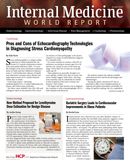Fecal Microbiota Transplantation Treatment Effective in Diarrhea Patients
In diarrhea patients, a frozen capsule fetal microbiota transplantation treatment can be effective to eliminate symptoms.

An effective treatment for patients with relapsing Clostridium difficile infection (CDI) is frozen fetal microbiota transplantation (FMT), according to research published in JAMA on October 11, 2014.
Researchers from Massachusetts General Hospital in Boston, MA studied 20 patients’ stool capsule transplants from unrelated donors between July 2013 and January 2014. The CDI found in patients was defined as more than 3 loose stools per day along with a positive stool test result. Patients aged 7-90 years with refractory or recurrent CDI were included, which was defined as 3 or more episodes of mild to moderate CDI, 2 of which were severe and resulted in hospitalization and associated with morbidity. The CDI inclusion data was also met by failure of a 6- to 8-week taper with vancomycin with or without an alternative antibiotic treatment.
The 4 stool donors were healthy, nonpregnant, nonobese adults aged 18-50 years who were not on medications. Donors were told to avoid eating common allergens in the 5 days leading up to donations, but not to otherwise alter their diets. The stool was screened for hepatitis A, B, and C, human immunodeficiency virus (HIV), and Treponema pallidum within 2 weeks of donation. After 4 weeks, donations were retested for the same infectious diseases. Donations were then frozen in normal saline, pipetted into capsules, and transported to the clinic on dry ice.
The participants discontinued their CDI antibiotics for 48 hours prior to FMT and fasted for 4 hours prior to, and 1-hour after capsule intake. Patients received 15 capsules over 2 days. Patients that showed no improvement in diarrhea symptoms after 3 days were retested and offered re-treatment. If they received a re-treatment, stool from the same donor was used to minimize exposure to infectious diseases.
Follow up was conducted with the FMT participants on days 1, 2, 3, 7, 14, 21, and 2 and 6 months after the procedure via questionnaires. The researchers highlight that no serious adverse events were observed. Additionally, no patient vomited within 24 hours of capsule administration. Cramping and bloating occurred in 6 patients (30%), but was resolved within 72 hours.
Fourteen patients (70% of participants) remained symptom free for 8 weeks after the first administration. The remaining 6 patients were re-treated at a mean of 7 days after the first procedure, of which 5 patients showed diarrhea resolution after their second treatment. Only 1 patient relapsed within the 8 week period after follow up, which resulted in an overall diarrhea resolution of 90%. Patients who received a second treatment were more symptomatic than the single administration group.
The researchers also noted that the daily number of bowel movements decreased from a median of 5 prior to the administration, to 2 by day 3 and 1 by 2 months post-treatment. Participants self-reported improved health over the 2 months on questionnaires scaled 1 to 10.
“We demonstrated the feasibility of oral administration of frozen encapsulated fecal material from unrelated donors to treat patients with recurrent CDI, with an overall rate of clinical resolution of diarrhea of 90%,” the authors wrote. They hope their results can contribute to wider-scale FMT treatment in the future.
